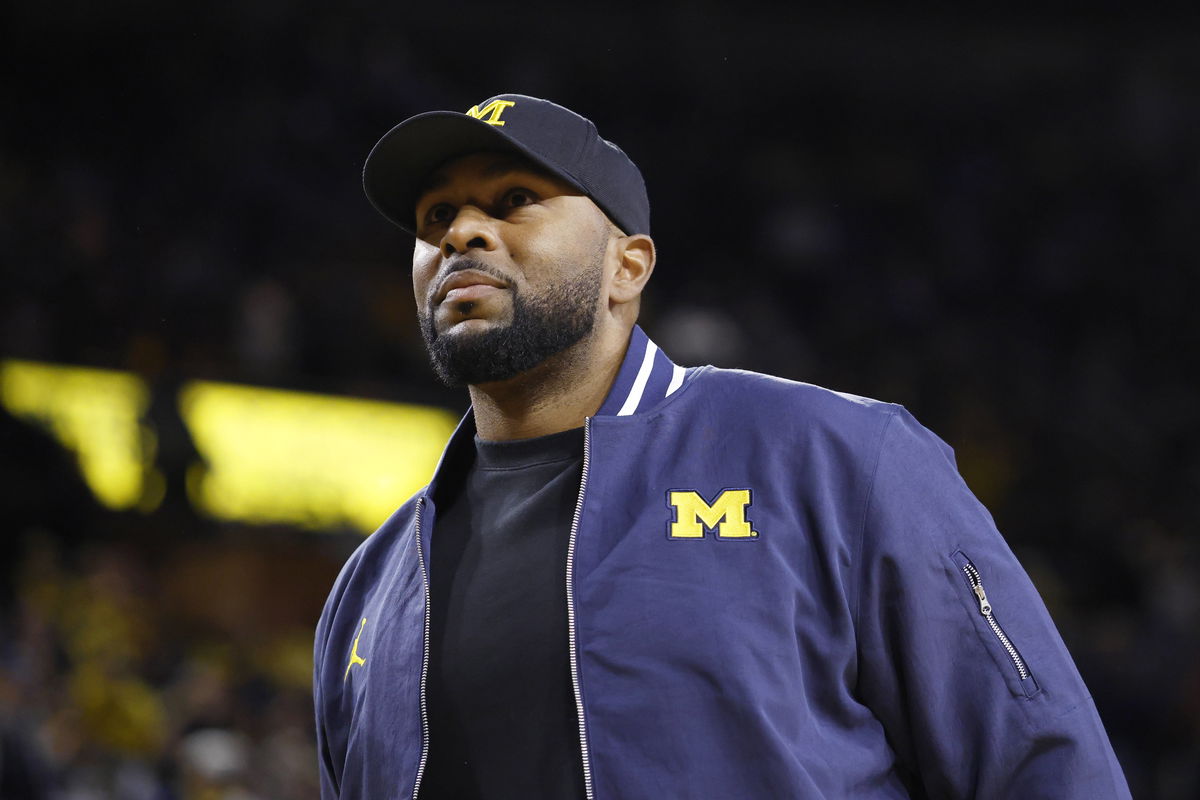
Imago
NCAA, College League, USA Basketball: Northwestern at Michigan Jan 19, 2025 Ann Arbor, Michigan, USA Michigan Wolverines head football coach Sherrone Moore fires up the crowd in overtime of the basketball game against the Northwestern Wildcats at Crisler Center. Ann Arbor Crisler Center Michigan USA, EDITORIAL USE ONLY PUBLICATIONxINxGERxSUIxAUTxONLY Copyright: xRickxOsentoskix 20250119_tbs_aa1_736

Imago
NCAA, College League, USA Basketball: Northwestern at Michigan Jan 19, 2025 Ann Arbor, Michigan, USA Michigan Wolverines head football coach Sherrone Moore fires up the crowd in overtime of the basketball game against the Northwestern Wildcats at Crisler Center. Ann Arbor Crisler Center Michigan USA, EDITORIAL USE ONLY PUBLICATIONxINxGERxSUIxAUTxONLY Copyright: xRickxOsentoskix 20250119_tbs_aa1_736
Michigan’s sign-stealing drama has finally reached the verdict stage, capping a two-year odyssey that began when low-level staffer Connor Stalions was accused of choreographing an in-person scouting ring during the 2021-23 seasons. What followed was a drip-feed of leaked evidence, televised hearings, and six Level I charges that turned the story into a running subplot beneath Michigan’s title run. When the NCAA’s Committee on Infractions issued its decision on Aug. 15, it billed the ruling as the closing chapter to a scandal that had hovered over Sherrone Moore and the program since October 2023.
Watch What’s Trending Now!
The sanctions landed with a real financial bite. Michigan must pay a $50,000 base fine, forfeit 10 percent of its football budget, surrender 10 percent of its football scholarship outlay for 2025-26, and give up every penny of postseason revenue sharing for the 2025 and 2026 seasons. This is a package that will easily eclipse $30 million, as per analysts. The program also drew four years’ probation, sharp recruiting limits, and a three-game suspension for head coach Sherrone Moore: two contests Michigan had already self-imposed this fall, plus the 2026 opener. Administrators immediately filed notice of appeal, but must comply with the penalties while that process plays out.
Athletic director Warde Manuel minced no words when asked how the ruling struck him. “We shouldn’t have been anywhere close to this,” he told The Michigan Insider, stressing that the university expects its staff to steer clear of even borderline violations. He then issued a blunt directive: “If you think you don’t understand a rule, you better ask the question before you do anything.” Manuel’s chief complaint is the way the NCAA attached money to postseason revenue, a linkage he says “went way too far for what these violations were”.

Manuel also made a point of backing his first-year head coach. “The staff has been great. Sherrone has been great … he is apologetic about his involvement in it,” the AD said, noting several closed-door meetings in which Moore acknowledged his mistakes and walked through new compliance safeguards. That public vote of confidence matters. Sherrone Moore’s three-game absence will test a roster already reshuffling its sideline hierarchy, but Manuel’s comments signal the administration believes the coach has owned his role and can steer the program forward.
Where, then, does Michigan go from here? The appeal will grind through NCAA bureaucracy, yet the season opener against Central Michigan arrives with or without a final ruling. The Wolverines return a lot of starters and, once Moore’s suspension is served, will again field one of the Big Ten’s deepest lineups. Manuel and Moore both will be trying to move forward the right way, emphasizing strict adherence to compliance while chasing another conference crown. For a team that has lived under investigation for 24 months, simply getting back to football may be the most welcome victory of all.
Manuel’s postseason penalty criticism
Athletic director Warde Manuel had a lot to say when expressing his frustration with how the NCAA structured Michigan’s punishment, particularly taking issue with the committee’s decision to link financial penalties to postseason. In a conversation with The Michigan Insider, Manuel articulated his core objection to the NCAA’s approach: “The disappointment to me is that they tried to tie this to postseason as it relates to what the penalty structure was. And then on top of that, to put fines at the level that they did to me was too far—way too far—for what these violations were.”
The crux of Manuel’s criticism centers on what he views as an inappropriate connection between sign-stealing violations and postseason achievements. Despite the NCAA’s decision to avoid an actual postseason ban, Manuel argued that such punishment should never have been considered in the first place. “I acknowledge the Committee on Infractions’ decision to not penalize our current student-athletes by eliminating postseason opportunities; however, a postseason ban should never have been a consideration in this case.” His position clearly shows a belief that the violations, while serious, didn’t warrant penalties that would strip away revenue from championship runs earned on the field.
Manuel’s stance becomes more pointed when considering the NCAA’s own rationale for the financial structure. The committee explicitly stated that Michigan’s repeat violator status and Level I-Aggravated case classification provided “sufficient grounds for a multiyear postseason ban,” yet chose monetary penalties instead to avoid punishing current student-athletes. For Manuel, this reasoning felt like having it both ways, using the threat of a postseason ban to justify massive fines while claiming to protect current players. His disappointment is part of a broader tension between Michigan’s administration and what they perceive as the NCAA’s overreach in connecting competitive violations to championship achievements.
.png)
.png)
.png)





